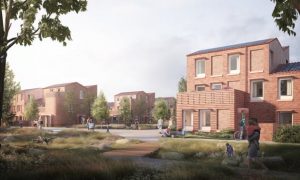“York plans to build Britain’s biggest zero-carbon housing project, boasting 600 homes in car-free cycling paradises full of fruit trees and allotments. When will the rest of the UK catch up?”
.
Exeter has several plans to make life a little more pleasant:
Higher-density car-free neighbourhoods for Exeter – Vision Group for Sidmouth
.
However, there are serious questions around how much of this can be delivered:
The ‘Net Zero’ Exeter plan has “profound flaws” – Vision Group for Sidmouth
Exeter Transport Strategy: slowly emerging… – Vision Group for Sidmouth
New cycle lanes and wider pavements: abandoned in Exeter – Vision Group for Sidmouth
.
Perhaps Exeter needs to look to Norwich:
.
 It can now look to an even more ambitious project happening in York:
It can now look to an even more ambitious project happening in York:
Mikhail Riches reveals York plan for UK’s largest Passivhaus programme (paywall)
.
With the Guardian’s architecture correspondent Oliver Wainwright getting very enthusiastic:
‘This is the Everest of zero carbon’ – inside York’s green home revolution
The city plans to build Britain’s biggest zero-carbon housing project, boasting 600 homes in car-free cycling paradises full of fruit trees and allotments. When will the rest of the UK catch up?
The council has selected as lead architect London-based practice Mikhail Riches, the firm behind the acclaimed Stirling prize-winning Goldsmith Street in Norwich. That scheme of 100 council homes showed that the stringent Passivhaus low-energy standard doesn’t have to mean ugly rendered boxes with tiny windows. The beautiful brick terraced houses, with high ceilings, thick insulated walls and fully airtight construction, are set in a cleverly landscaped masterplan, with communal play spaces and the tight-knit neighbourly feeling of a traditional Victorian terrace. But York is aiming to go even further.
“Passivhaus is like base camp when you’re trying to climb the Everest of zero carbon,” says architect David Mikhail. “We’re planning to go above and beyond, taking into account much more than just the efficient fabric of the houses.”
Starting from first principles, the plans entail nothing less than rethinking the way such neighbourhoods can be arranged. Cars will be banished to the very corners of the sites, so the streets can be devoted entirely to people and play spaces. Generous green “ginnels”, or passages between houses, will run between the rows of homes and around the edges of the developments, providing communal areas to garden, sit together and grow food. And – an essential feature in this compact, flat, cycle-friendly city – every house will come with a bike shed, or even two, fitted with electric charging points, while a fleet of shared “cargo bikes” will also be available to rent, for those occasions when panniers won’t quite cut it…
.
Exeter does have a fleet of cargo bikes: